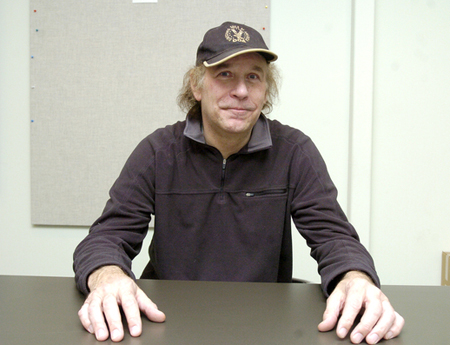
Pity poor George Orwell, who never would have had to make as much as one revolution in—or even gone to—his grave if he had been able to hang on long enough to see this documentary.
East End filmmaker Robert Kane Pappas, whose 2003 documentary, “Orwell Rolls in His Grave” decried consolidated corporate ownership of the media, has just completed a new film that takes a sympathetic look at people the mainstream media has been only too happy to ridicule: those who say they’ve discovered the fountain of youth.
“To Age or Not To Age” had its first screening last week, on February 11, at the aptly dedicated Leonard Nimoy Thalia theater in Manhattan (simulcast to a handful of theaters around the country), followed by a panel discussion with many of the scientists featured in the film. Mr. Pappas, who hails from Southampton, said a screening somewhere on the East End should follow within a few weeks.
The film profiles researchers who have discovered a genetic mechanism that regulates aging and also found that the aging process occurs across a broad spectrum of organisms—from yeast to mice to humans—in surprisingly similar ways.
But here’s the interesting wrinkle: Scientists believe that by controlling that genetic regulator, they can mitigate or ameliorate many of the diseases that correlate with advanced age, including cancer, cardiovascular disease, neurodegenerative disease, diabetes.
“They found out that aging and disease are molecular twins,” Mr. Pappas explained during a recent telephone interview.
The major source of excitement in the scientific community, he said, is that people could actually be healthier, not just living longer. Longevity is a side effect.
“I believe this is going to be the biggest story in the history of medicine, the history of humanity,” Mr. Pappas gushed. “It sounds kooky, but it isn’t.”
Listen to Mr. Pappas talk about the scientists he’s been filming for the past three years and the obvious conclusion is that yes, in fact, he does sound kooky, or worse. The filmmaker readily acknowledges that he is an artist who admits to having no scientific background; how could he possibly evaluate good science from bad, plausible claims from science fiction? Humans living to be 150? Or 1,000? A woman in her 90s with the physiology of a 50-year-old? All this is right around the corner?
But then watch “To Age or Not To Age,” and hear the story directly—without hyperbole—from the gerontologists and microbiologists from MIT and Harvard and other esteemed institutions, and the anti-aging research doesn’t sound far-fetched at all.
As one scientist puts it, the discovery seems as fundamental as the decoding of DNA.
Only one of the film’s subjects, Aubrey de Grey, a theorist renowned more for his Z.Z. Top beard than for his scientific credentials, claims that humans soon will live to be thousands of years old—barring global catastrophe, of course.
But excise Mr. de Grey from the film and the researchers that remain— Steven Austad, Leonard Guarente, Cynthia Kenyon, David Sinclair, Christoph Westphal and others—have more than enough lab cred and sufficiently conservative projections to satisfy a skeptical viewer: it should soon be possible to expand the human lifespan by (a few? several?) percentage points while staving off certain diseases.
At least, the early returns from scientific studies were promising enough for pharmaceutical giant GlaxoSmithKline to spend $720 million in 2008 to acquire a start-up pharmaceutical company co-founded by Dr. Westphal conducting anti-aging research.
And the projections are plausible enough for some of the scientists to start ingesting concentrated doses of resveratrol, a naturally occurring substance that’s found, among other places, in the skin of red grapes, that has proven to delay aging and disease in mice. (Scientists have now created synthetic substances that are 1,000 times stronger than resveratrol.)
Throughout the film, Mr. Pappas, in voice over and with intertitles, gestures at some of the political, social and ethical questions raised by the specter of a wonder drug that could make people live longer, healthier lives.
But, in reality, the film is just an introduction, a survey course for non-science majors. “There are literally five sequels here,” Mr. Pappas said. “This is an incredible subject.”
Mr. Pappas’s film, which runs about 90 minutes, is peppered with Hamptons scenes and personalities: local residents gathering to discuss the desirability of longer lives, balancing out some of the technical-minded talking heads that comprise most of the film.
Mr. Pappas said he’s not quite sure how he feels about the prospects of substantially longer life for the global population, and he says he personally isn’t ready for a strict low-calorie diet and steady regimen of resveratrol.
In the film, he refrains from advocating for a particular outcome or lifestyle.
“I’m a film director, I’m not a holy roller,” he said. “I eat reasonably, but plenty of calories and I drink beer.”
Is he ready to live to 150?
“I’m too busy,” he said.